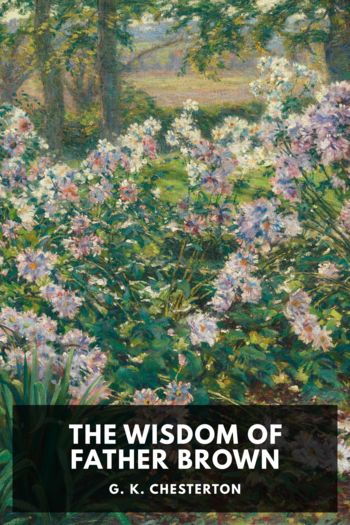The Wisdom of Father Brown - G. K. Chesterton (read full novel .txt) 📗

- Author: G. K. Chesterton
Book online «The Wisdom of Father Brown - G. K. Chesterton (read full novel .txt) 📗». Author G. K. Chesterton
Halfway down one side of the house stood out a projection like a very low shed; it was, as he afterwards discovered, a large dustbin. Round the corner of this came a figure, at first a mere shadow in the haze, apparently bending and peering about. Then, coming nearer, it solidified into a figure that was, indeed, rather unusually solid. Major Putnam was a bald-headed, bull-necked man, short and very broad, with one of those rather apoplectic faces that are produced by a prolonged attempt to combine the oriental climate with the occidental luxuries. But the face was a good-humoured one, and even now, though evidently puzzled and inquisitive, wore a kind of innocent grin. He had a large palm-leaf hat on the back of his head (suggesting a halo that was by no means appropriate to the face), but otherwise he was clad only in a very vivid suit of striped scarlet and yellow pyjamas; which, though glowing enough to behold, must have been, on a fresh morning, pretty chilly to wear. He had evidently come out of his house in a hurry, and the priest was not surprised when he called out without further ceremony: “Did you hear that noise?”
“Yes,” answered Father Brown; “I thought I had better look in, in case anything was the matter.”
The Major looked at him rather queerly with his good-humoured gooseberry eyes. “What do you think the noise was?” he asked.
“It sounded like a gun or something,” replied the other, with some hesitation; “but it seemed to have a singular sort of echo.”
The Major was still looking at him quietly, but with protruding eyes, when the front door was flung open, releasing a flood of gaslight on the face of the fading mist; and another figure in pyjamas sprang or tumbled out into the garden. The figure was much longer, leaner, and more athletic; the pyjamas, though equally tropical, were comparatively tasteful, being of white with a light lemon-yellow stripe. The man was haggard, but handsome, more sunburned than the other; he had an aquiline profile and rather deep-sunken eyes, and a slight air of oddity arising from the combination of coal-black hair with a much lighter moustache. All this Father Brown absorbed in detail more at leisure. For the moment he only saw one thing about the man; which was the revolver in his hand.
“Cray!” exclaimed the Major, staring at him; “did you fire that shot?”
“Yes, I did,” retorted the black-haired gentleman hotly, “and so would you in my place. If you were chased everywhere by devils and nearly—”
The Major seemed to intervene rather hurriedly. “This is my friend Father Brown,” he said. And then to Brown: “I don’t know whether you’ve met Colonel Cray of the Royal Artillery.”
“I have heard of him, of course,” said the priest innocently. “Did you—did you hit anything?”
“I thought so,” answered Cray with gravity.
“Did he—” asked Major Putnam in a lowered voice, “did he fall or cry out, or anything?”
Colonel Cray was regarding his host with a strange and steady stare. “I’ll tell you exactly what he did,” he said. “He sneezed.”
Father Brown’s hand went halfway to his head, with the gesture of a man remembering somebody’s name. He knew now what it was that was neither soda-water nor the snorting of a dog.
“Well,” ejaculated the staring Major, “I never heard before that a service revolver was a thing to be sneezed at.”
“Nor I,” said Father Brown faintly. “It’s lucky you didn’t turn your artillery on him or you might have given him quite a bad cold.” Then, after a bewildered pause, he said: “Was it a burglar?”
“Let us go inside,” said Major Putnam, rather sharply, and led the way into his house.
The interior exhibited a paradox often to be marked in such morning hours: that the rooms seemed brighter than the sky outside; even after the Major had turned out the one gaslight in the front hall. Father Brown was surprised to see the whole dining-table set out as for a festive meal, with napkins in their rings, and wineglasses of some six unnecessary shapes set beside every plate. It was common enough, at that time of the morning, to find the remains of a banquet overnight; but to find it freshly spread so early was unusual.
While he stood wavering in the hall Major Putnam rushed past him and sent a raging eye over the whole oblong of the tablecloth. At last he spoke, spluttering: “All the silver gone!” he gasped. “Fish-knives and forks gone. Old cruet-stand gone. Even the old silver cream-jug gone. And now, Father Brown, I am ready to answer your question of whether it was a burglar.”
“They’re simply a blind,” said Cray stubbornly. “I know better than you why people persecute this house; I know better than you why—”
The Major patted him on the shoulder with a gesture almost peculiar to the soothing of a sick child, and said: “It was a burglar. Obviously it was a burglar.”
“A burglar with a bad cold,” observed Father Brown, “that might assist you to trace him in the neighbourhood.”
The Major shook his head in a sombre manner. “He must be far beyond trace now, I fear,” he said.
Then, as the restless man





Comments (0)